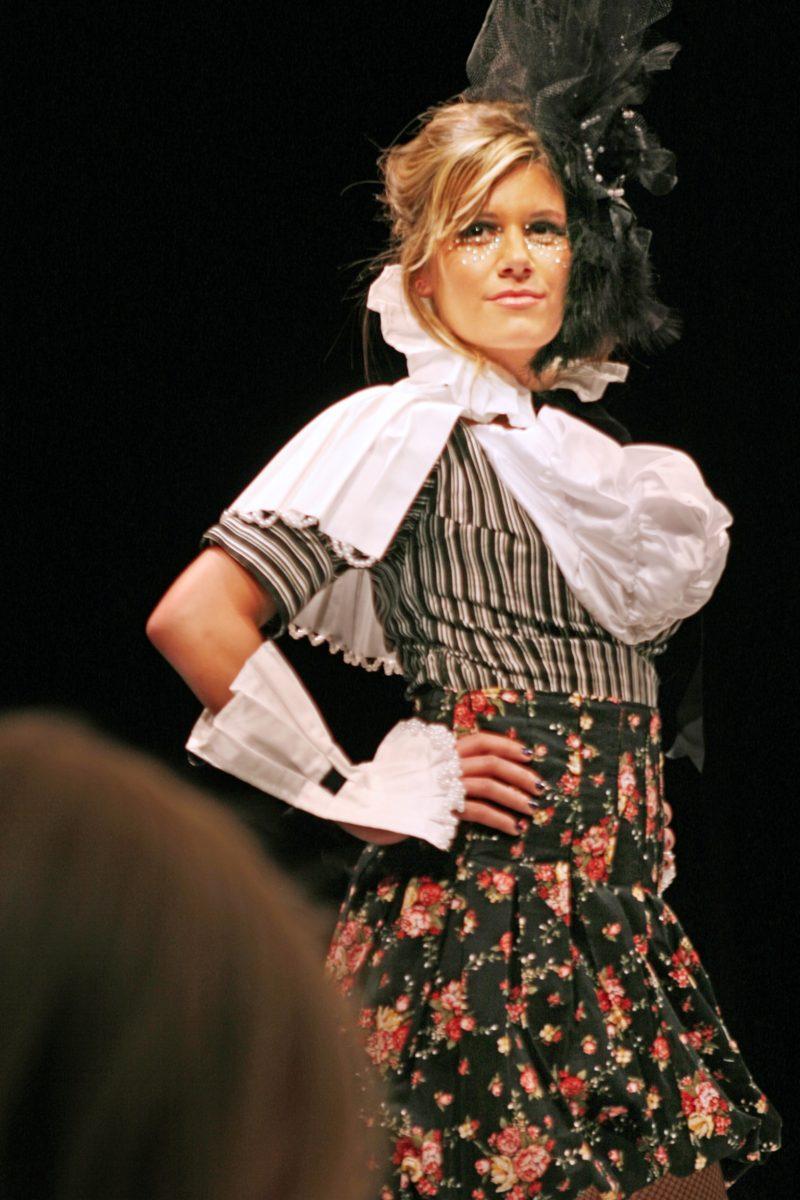Cotton, one of the original cash crops of North Carolina farmers relinquished its humble roost and took an haute turn on the runway at the Cotton Couture fashion show Thursday night. Each model that strode down the catwalk wore student-created designs made of, at least, 75 percent cotton fabric.
The show was a collaborative effort between the College of Textiles and Cotton Incorporated. It was one of only a few national university programs that received sponsorship in 2008 from the corporation.
Mark Messura, executive vice president of the global product supply chain division of Cotton Inc., said the corporation sponsored the show because “it raises awareness for cotton.”
The show also raised awareness for the leading cause of death among women in America — heart disease. Proceeds from ticket sales, T-shirt sales and silent auction items benefitted the American Heart Association’s Go Red for Women campaign.
The charitable theme of the evening was echoed throughout the show. Master of ceremonies, reporter Julie Henry of NBC 17, wore four different dresses throughout the show. Each was designed by a professor or student in the College of Textiles and each was red, in honor of Go Red for Women. All four dresses were auctioned off to benefit the AHA, and, of course, all were made of cotton.
The everyday textile, loved by many as a mainstay in underwear and sock production, gave some designers a bit of trouble.
“To make something creative, it was tough to use cotton,” Stephanie Mejia, a sophomore in fashion and textile management, said.
The difficult fabric didn’t stop the 34 College of Textiles students who populated the two-hour show with dozens of hand-sewn designs. Women’s dresses were the most popular silhouette with most of the designers who competed for the $300, $400 and $500 prizes, but everything from men’s jackets to high-waisted women’s pants made a showing.
Mejia entered her untitled design in the beginner’s individual category. It was her first fashion show, and she did everything herself, from sewing the outfit to doing her model’s makeup.
“I was going, overall, for a couture look. It took me maybe a week to put everything together,” Mejia said.
Lorenzo Agustin, a senior in textile and apparel management, also took a very high-fashion approach to his poufy, betulled entry — but with a pink twist.
“It’s an alternative, punk Marie Antoinette. I reused the fabric. This is the actual fabric used in the [warm-up suits] for the women’s basketball team for the Hoops for Hope game last year,” he said.
His reused fabric held special significance, but it also saved him some money.
“I spent about $5 total, but it would probably sell for $100 — $95 profit,” Agustin said.
Other designers, like Mejia and Chase Kennedy — another first-timer, shelled quite a bit more than that for their designs.
Kennedy, a sophomore in fashion and textile management who entered his five designs in the collection category, said he spent “more than $100.”
His collection, called Labor and Post Punk Formalities, was composed entirely of black, white and denim and consisted of four close-cut men’s looks and one women’s look.
Models wore dozens of varied looks, from the eclectic to the classic, down the runway, but the five expert judges narrowed the more than 50 individual outfits and collections down to just a few.
Sarah Deasy, a junior in textile and apparel management won first in the intermediate category with “Better Together,” and Minyoung Suh, a graduate student in textile and apparel technology and management, grabbed first in the advanced category with “Exotic Feminine.”
The fashion newcomers held their own though. Mejia took first place in the beginner category and Kennedy’s collection was the judges favorite.
Both were thrilled with their wins.
“I was so nervous,” Mejia said. “But now I’m so happy!”
Chase, who was surrounded by fans by the close of the show, said he didn’t expect the win, especially since he was up against one of his mentors.
“It’s unbelievable,” he said. “I’ll absolutely do more collections.”
And that attitude is just what the College of Textiles and Cotton Inc.’s Messura were looking for.
“The students that [were] involved in this project are the next round of designers in textiles,” he said.
Cotton Couture T-shirts are available for $10 and $15 from the College of Textiles.








